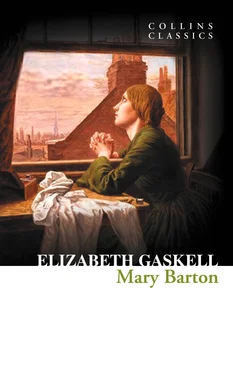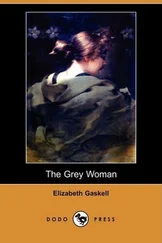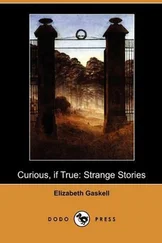1 ...7 8 9 11 12 13 ...29 Mary stole a glance at Margaret to see what she thought of Alice’s geography; but Margaret looked so quiet and demure, that Mary was in doubt if she were not really ignorant. Not that Mary’s knowledge was very profound, but she had seen a terrestrial globe, and knew where to find France and the continents on a map.
After this long talking Alice seemed lost for a time in reverie; and the girls, respecting her thoughts, which they suspected had wandered to the home and scenes of her childhood, were silent. All at once she recalled her duties as hostess, and by an effort brought back her mind to the present time.
‘Marget, thou must let Mary hear thee sing. I don’t know about fine music myself, but folks say Marget is a rare singer, and I know she can make me cry at any time by singing “Th’ Owdham Weaver.” Do sing that, Marget, there’s a good lass.’
With a faint smile, as if amused at Alice’s choice of a song, Margaret began.
Do you know ‘The Oldham Weaver’? Not unless you are Lancashire born and bred, for it is a complete Lancashire ditty. I will copy it for you.
The Oldham Weaver
I
Oi’m a poor cotton-weyver, as mony a one knoowas,
Oi’ve nowt for t’ yeat, an’ oi’ve worn eawt my clooas,
Yo’ad hardly gi’ tuppence for aw as oi’ve on,
My clogs are both brosten, an’ stuckings oi’ve none,
Yo’d think it wur hard,
To be browt into th’ warld,
To be – clemmed, *an’ do th’ best as yo con.
II
Owd Dicky o’ Billy’s kept telling me lung,
Wee s’d ha’ better toimes if I’d but howd my tung,
Oi’ve howden my tung, till oi’ve near stopped my breath,
Oi think i’ my heeart oi’se soon clem to deeath,
Owd Dicky’s weel crammed,
He never wur clemmed,
An’ he ne’er picked ower i’ his loife. *
III
We tow’rt on six week – thinking aitch day wur th’ last,
We shifted, an’ shifted, till neaw we’re quoite fast;
We lived upo’ nettles, whoile nettles wur good,
An’ Waterloo porridge the best o’ eawr food,
Oi’m tellin’ yo’ true,
Oi can find folk enow,
As wur livin’ na better nor me.
IV
Owd Billy o’ Dans sent th’ baileys one day,
Fur a shop deebt oi eawd him, as oi could na pay,
But he wur too lat, fur owd Billy o’ th’ Bent
Had sowd th’ tit an’ cart, an’ ta’en goods for th’ rent,
We’d neawt left bo’ tho’ owd stoo’,
That wur seeats fur two,
An’ on it ceawred Marget an’ me.
V
Then t’ baileys leuked reawnd as sloy as a meawse,
When they seed as aw t’ goods were ta’en eawt o’ t’ heawse,
Says one chap to th’ tother, ‘Aws gone, theaw may see’;
Says oi, ‘Ne’er freet, mon, yeaur welcome ta’ me.’
They made no moor ado,
But whopped up th’ eawd stoo’,
An’ we booath leet, whack – upo’ t’ flags!
VI
Then oi said to eawr Marget, as we lay upo’ t’ floor,
‘We’s never be lower i’ this warld, oi’m sure,
If ever things awtern, oi’m sure they mun mend,
For oi think i’ my heart we’re booath at t’ far eend;
For meeat we ha’ none,
Nor looms t’ weyve on, –
Edad! they’re as good lost as fund.’
VII
Eawr Marget declares, had hoo clooas to put on,
Hoo’d goo up to Lunnon an’ talk to th’ greet mon;
An’ if things were na awtered when there hoo had been,
Hoo’s fully resolved t’ sew up meawth an’ eend;
Hoo’s neawt to say again t’ king,
But hoo loikes a fair thing,
An’ hoo says hoo can tell when hoo’s hurt.
The air to which this is sung is a kind of droning recitative, depending much on expression and feeling. To read it, it may, perhaps, seem humorous; but it is that humour which is near akin to pathos, and to those who have seen the distress it describes it is a powerfully pathetic song. Margaret had both witnessed the destitution, and had the heart to feel it, and withal, her voice was of that rich and rare order, which does not require any great compass of notes to make itself appreciated. Alice had her quiet enjoyment of tears. But Margaret, with fixed eye, and earnest, dreamy look, seemed to become more and more absorbed in realising to herself the woe she had been describing, and which she felt might at that very moment be suffering and hopeless within a short distance of their comparative comfort.
Suddenly she burst forth with all the power of her magnificent voice, as if a prayer from her very heart for all who were in distress, in the grand supplication, ‘Lord, remember David.’ Mary held her breath, unwilling to lose a note, it was so clear, so perfect, so imploring. A far more correct musician than Mary might have paused with equal admiration of the really scientific knowledge with which the poor depressed-looking young needlewoman used her superb and flexile voice. Deborah Travers herself (once an Oldham factory girl, and afterwards the darling of fashionable crowds as Mrs Knyvett) might have owned a sister in her art.
She stopped; and with tears of holy sympathy in her eyes, Alice thanked the songstress, who resumed her calm, demure manner, much to Mary’s wonder, for she looked at her unweariedly, as if surprised that the hidden power should not be perceived in the outward appearance.
When Alice’s little speech of thanks was over, there was quiet enough to hear a fine, though rather quavering, male voice, going over again one or two strains of Margaret’s song.
‘That’s grandfather!’ exclaimed she. ‘I must be going, for he said he should not be at home till past nine.’
‘Well, I’ll not say nay, for I have to be up by four for a very heavy wash at Mrs Simpson’s; but I shall be terrible glad to see you again at any time, lasses; and I hope you’ll take to one another.’
As the girls ran up the cellar steps together, Margaret said: ‘Just step in, and see grandfather, I should like him to see you.’
And Mary consented.
*‘Liefer’, rather. A.S. leof , dear. ‘There n’is no thing, sauf bred, that me were lever .’ – CHAUCER, Monk’s Tale .
*‘Come to me, Tyrrel, soon, at after supper.’ – SHAKESPEARE, Richard III .
*‘Frabbit’, peevish.
*‘Clem’, to starve with hunger. ‘Hard is the choice, when the valiant must eat their arms or clem. ’ – BEN JONSON.
*To ‘pick ower’ means to throw the shuttle in hand-loom weaving.
The Mill on Fire – Jem Wilson to the Rescue
‘Learned he was; nor bird, nor insect flew,
But he its leafy home and history knew:
Nor wild-flower decked the rock, nor moss the well,
But he its name and qualities could tell.’
ELLIOTT
There is a class of men in Manchester, unknown even to many of the inhabitants, and whose existence will probably be doubted by many, who yet may claim kindred with all the noble names that science recognises. I said in ‘Manchester’, but they are scattered all over the manufacturing districts of Lancashire. In the neighbourhood of Oldham there are weavers, common hand-loom weavers, who throw the shuttle with unceasing sound, though Newton’s ‘Principia’ lies open on the loom, to be snatched at in work hours, but revelled over in meal times, or at night. Mathematical problems are received with interest, and studied with absorbing attention by many a broad-spoken, common-looking factory-hand. It is perhaps less astonishing that the more popularly interesting branches of natural history have their warm and devoted followers among this class. There are botanists among them, equally familiar with either the Linnæan or the Natural system, who know the name and habitat of every plant within a day’s walk from their dwellings; who steal the holiday of a day or two when any particular plant should be in flower, and tying up their simple food in their pocket-handkerchiefs, set off with single purpose to fetch home the humble-looking weed. There are entomologists, who may be seen with a rude looking net, ready to catch any winged insect, or a kind of dredge with which they rake the green and slimy pools; practical, shrewd, hard-working men, who pore over every new specimen with real scientific delight. Nor is it the common and more obvious divisions of Entomology and Botany that alone attract these earnest seekers after knowledge. Perhaps it may be owing to the great annual town-holiday of Whitsun-week so often falling in May or June, that the two great beautiful families of Ephemeridæ and Phryganidæ have been so much and so closely studied by Manchester workmen, while they have in a great measure escaped general observation. If you will refer to the preface to Sir J. E. Smith’s Life (I have it not by me, or I would copy you the exact passage), you will find that he names a little circumstance corroborative of what I have said. Being on a visit to Roscoe, of Liverpool, he made some inquiries from him as to the habitat of a very rare plant, said to be found in certain places in Lancashire. Mr Roscoe knew nothing of the plant; but stated, that if any one could give him the desired information, it would be a hand-loom weaver in Manchester whom he named. Sir J. E. Smith proceeded by boat to Manchester, and on arriving at that town, he inquired of the porter who was carrying his luggage if he could direct him to So-and-So.
Читать дальше












